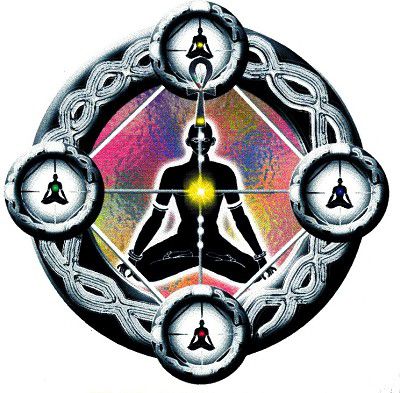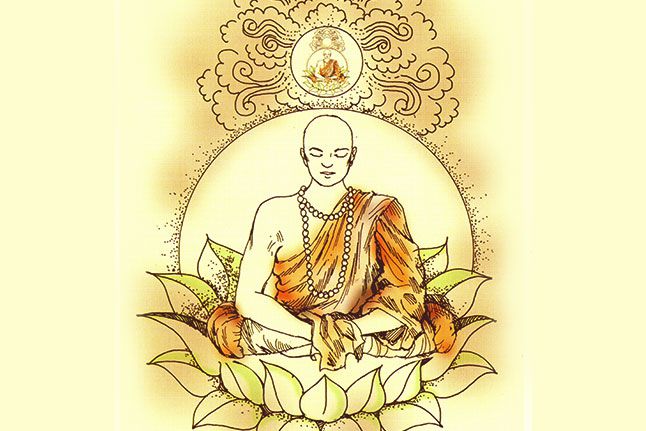No products in the cart.
Jnana yoga is the path of non-dual realization that leads to an experience of absolute truth.
What is the Meaning of Jnana?
The word ‘jnana’ (pronounced ‘gyan’) means knowledge. This is of two kinds:
1. Shabdatmak jnana — theoretical knowledge
2. Anubhavatmak jnana — practical knowledge
In Hinduism the word jnana has many connotations. Knowledge is viewed by the Hindu scriptures as both liberating and binding. Knowledge is viewed as the means to achieve certain ends. It can used to fulfill our desires or liberate ourselves.
The knowledge that helps us realize our selfish desires and perpetuate our limited identities is considered lower knowledge. It is also termed as avidya or ignorance. The knowledge that helps us overcome our egoistic attitude and desires and realize who we are is considered as higher knowledge or the real knowledge.
Real knowledge liberates us from the three impurities of human existences, namely egoism, desire ridden actions and the illusion that we are different from the rest of the world and that the objective reality which we experience through our senses is real and permanent.
Jnana yoga is therefore the pursuit of true knowledge learning how to control our minds and senses and center ourselves in our spiritual selves so that we can become free from our bondage to the cycle of the births and achieve liberation. The Bhagavad Gita identifies jnana yoga as one of the three paths to liberation, the path of knowledge, the path of action and the path of devotion. While the path of devotion is described as superior to the other two, jnana yoga is suitable for people who are deeply intellectual. On the path of liberation it is important to possess the right knowledge, which comes through the study of the scripture, which helps us understand the significance of other Hindu school of yogas such as karma yoga, sanyasa yoga, buddhi yoga, atma samyama yoga, and bhakti yoga.
Practices that lead to Jnana
The second chapter of the Bhagavad Gita is known as Jnana Yoga or Samkhya yoga. According to some scholars it is a summary of the Bhagavad Gita itself since it contains all the important concepts and ideas of the scripture. It reminds us that we should not identify ourselves with our minds and bodies as we are immortal, spiritual beings and that to transcend our limited nature we have have to gain control over our sense organs and our desires through detachment and equanimity and work for our salvation by performing actions for the sake of God. According to the Bhagavad Gita, jnana yoga consists of the following practices.
- Developing correct awareness of the mind, the body and the Atman or Self.
- Purification of the body and the mind through self-discipline (atma-samyamyoga)
- Acquiring true awareness of the world around and the SUPREME-Self beyond. (Knowledge of Sat (Truth) and Asat (Falsehood)
- Practicing various disciplines and other techniques as a means to self-purification and elevation and elimination of thought process.
Jnana Yoga in the Bhagavad Gita
Information and teachings related to jnana yoga or the path of knowledge can be found in the following chapters of the Bhagavad Gita. They emphasize the importance of cultivating knowledge that lead to discovering wisdom, devotion and detachment that is required to practice karma yoga.
- The Yoga of Self-discipline (Chapter VI)
- The Yoga of Physics and Meta Physics. Chapter VII)
- The Yoga of Imperishable Brahman. Chapter VIII)
- The Yoga of Royal Knowledge. Chapter IX)
- The Yoga of Divine Manifestation. Chapter X )
- The Yoga of the Vision of Cosmic Form (Chapter XI)
- The Yoga of Kshetra and Kshetragna .(Chapter XIII)
- The Yoga of the Division of the Gunas (Chapter XIV)
- The Yoga of Divine and Undivine Qualities (Chapter XVI)
- Renunciation of Action with Knowledge. Chapter IV)
Jnana Yoga is a process of learning to discriminate between what is real and what is not, what is eternal and what is not. Through a steady advancement in realization of the distinction between Real and the Unreal, the Eternal and the Temporal, one develops into a Jnani. This is essentially a path of knowledge and discrimination in regards to the difference between the immortal soul (atman) and the body.
It is the process of converting intellectual knowledge into practical wisdom. Jnana literally means ‘knowledge’, but in the context of yoga it means the process of meditative awareness which leads to illuminative wisdom. It is not a method by which we try to find rational answers to eternal questions, rather it is a part of meditation leading to self-enquiry and self-realisation. Before practicing Jnana Yoga, the aspirant needs to have integrated the lessons of the other yogic paths – for without selflessness and love of God, strength of body and mind, the search for self-realization can become mere idle speculation.
Taking the philosophy of Vedanta the Jnana Yogi uses his mind to inquire into its own nature. We perceive the space inside and outside a glass as different, just as we see ourselves as separate from God. Jnana Yoga leads the devotee to experience his unity with God directly by breaking the glass, dissolving the veils of ignorance (maya).
“Brahma Satyam. Jagat Mithya. Jivo Brahmaiva Na Parah” – Sri Shankaracharya
Meaning: God only is real. The world is unreal. The individual is none other than God.
True Purpose of Jnana Yoga
The purpose of jnana yoga is to achieve liberation by realizing our true nature, overcoming our ignorance and transcending our limited selves that are usually sense dependent and bound by karma. According to the Bhagavadgita, following are some of the developments that we experience when we practice jnana yoga.
- Equanimity of the mind (sthithadhi) through control of the senses and desires and mental discipline.
- Detachment (asangatva)
- Impassion (virag)
- Tyaga (sacrifice)
Knowledge through study of scriptures, contemplation, intuition, service to God and teachers, Divine Grace, discussion, teaching, observation and personal spiritual experience.
Although any seeker of spiritual knowledge could be called a jnani, in particular this refers to those who follow ‘jnana yoga’, the path of jnana.
The ultimate spiritual aim of a jnani is to realize or attain practical and experienced knowledge of the impersonal or formless aspect of God (or brahm) or absolute truth.
 Practical knowledge of this aspect of God is called brahm jnana. (brahm – God, jnana – knowledge). The bliss associated brahm jnana is called ‘brahm-anand’ (anand – divine bliss). This realization is also referred to as absolute liberation, mukti or kaivalya moksha, because it liberates the practitioner forever from the bondage of Maya.
Practical knowledge of this aspect of God is called brahm jnana. (brahm – God, jnana – knowledge). The bliss associated brahm jnana is called ‘brahm-anand’ (anand – divine bliss). This realization is also referred to as absolute liberation, mukti or kaivalya moksha, because it liberates the practitioner forever from the bondage of Maya.
This is also the ultimate goal of the teachings of the Yoga Darshan of Maharishi Patanjali, which is accomplished through the perfecting all eight limbs of ashtanga yoga.
In fact, yogis and gyanis share teachings and practices from both their traditions. Through the discrimination developed through jnana of what is truth and non-truth, a yogi overcomes any confusion or pride he may develop from attaining yogic powers or siddhis and which could be a distraction to or stop his spiritual progress in jnana yoga meditation.
Without the practices of yoga meditation, a jnani can’t fully establish true knowledge in his heart exclusively through intellectual discrimination.
Jnana Yoga Practice
The original propounder of the path of jnana was Adi Jagadguru Shankaracharya. As such his teachings of advaita vedanta form the base for its philosophy and practice.
The two main qualities of a practitioner who desires to enter path of jnana are:
1.Complete renunciation
2.A deep desire for absolute liberation from Maya
For such a practitioner, Shri Shanakaracharya outlined eight steps of jnana yoga.
These processes of self-discipline and yoga practice are for establishing the non-dual experience of formless divinity (advaita jnana), a very state of liberation that ultimately culminates only in ending one’s ignorance, not in guaranteeing an eternal experience of bliss.
The final step of the path of jnana yoga, nididhyasana, is for establishing nirvikalpa samadhi, the final stage of jnana.
Jnana Yoga is that path in Spirituality rarely treaded by even the most serious of all seekers. With none to guide, it is extremely difficult for one to proceed on this path. Only God-Realized Souls are competent to guide one on the path. How many such Souls are present in mankind at a given moment of time… maximum one or two!
God Realized Souls are those personalities who having started, in search of God… completed their journey… realized their inner self. Knower of Brahman (The creator of the cosmos)… they can guide Humanity if they so desire. Every God Realized soul has two paths to follow. Having emaciated themselves from the cycle of birth and death … they can leave their body … attain Moksha Salvation! Alternatively, they can give back to the community whatever they learnt… Help those who are seriously interested proceed on the path of Jnana Yoga .
Jnana Yoga primarily follows a set of rules without which achieving the ultimate is not possible.
Elevating self on the Cosmic Plane requires one to practice Absolute Celibacy. If persisted for a continuous period of twelve years coupled with purity of thought , one reaches the top gradually. Expect no miracles, All is the result of Karma performed.







Jnana yoga also known as Gyan yoga. It is the path of knowledge or wisdom. It it considered as one of the most difficult path of yoga as it requires great strength, intellect and will power. Jnana yoga provides a path to the absolute through knowledge . It makes one open-minded, sensible and enlightened. The ultimate goal of Jnana yoga is to set one free from the illusionary world of Maya and to attain unison of inner self and oneness of all life. This can be achieved through a process by practicing the mental technique of questioning, reflecting and self-illumination.
There are four stages of Jnana yoga:
1) Samanyasa
2) Sravana
3) Manana
4) Nididhyasana
Jnana Yoga is an age old practice but it has still not lost its relevance in today’s world. By practicing Jnana yoga one can attain the power to be wise and knowledgeable, the knowledge that makes a human being pride free and pure.